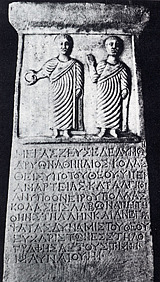Angelos Chaniotis to Discuss The Fear of God: An Emotion and Its Contexts in Lecture at Institute for Advanced Study

Angelos Chaniotis, Professor in the School of Historical Studies at the Institute for Advanced Study, will present a lecture entitled “The Fear of God: An Emotion and Its Contexts” on Wednesday, December 8, at 4:30 p.m. in Wolfensohn Hall on the Institute campus.
Chaniotis is well known internationally for his original and wide-ranging research in the social, cultural, religious, legal and economic history of the Hellenistic world and the Roman East. In this lecture, he will discuss how, in Greek religion, the encounter between mortals and gods was dominated by fear. The belief in the power of gods was based on experience and enhanced through rituals.
He will explain how cult regulations, narratives of punitive miracles, confession inscriptions and funerary curses allow us to study how the fear of god was constructed, justified and aroused through narratives and rituals, and how the public display and recitation of such inscriptions contributed to the construction and transmission of the concept of the divine in the Hellenized East.
Chaniotis works in innovative ways on a wide variety of topics: war, memory, identity, emotions, the communicative aspects of rituals and strategies of persuasion in the ancient world. Significant questions and dialogues in the field have grown out of his pioneering contributions, which have helped to advance understanding of previously unexplored aspects of the ancient world.
The author of several books including War in the Hellenistic World: A Social and Cultural History (2005), Chaniotis has served since 2007 as Editor of Mnemosyne and since 2006 as Editor of Kernos. He is currently working on another book, “From the City of Aphrodite to the City of the Cross: Constructing Identities at Aphrodisias.” He is the recipient of the Nikos Svoronos History Award in 1991 from the Institute of Mediterranean Studies/Institute of Technology and Research in Crete and he was awarded the Baden-Württemberg Prize for Pure Research in 2001.
After receiving a Ph.D. in Ancient History from the University of Heidelberg in 1984, he went on to study law at the University of Bonn from 1985 to 1986. He received his Habilitation in Ancient History from the University of Heidelberg in 1992. He joined the Department of Ancient History at the University of Heidelberg, where he served as Assistant Professor from 1987 to 1992 and Associate Professor from 1992 to 1994. Chaniotis was Visiting Professor in the Department of Classics and the Alexander S. Onassis Center for Hellenic Studies at New York University in 1993. He was named Associate Professor of Greek History at New York University in 1994, Acting Chair of the Department of Classics in 1996 and Professor of Greek History and Director of Graduate Studies in 1997.
In 1998, Chaniotis returned to the University of Heidelberg, where he served in a series of positions, including Professor of Ancient History, Chair of the Department of Ancient History, Associate Dean of the Faculty of Oriental and Ancient Studies and Vice Rector for International Relations. He was appointed Senior Research Fellow in Classics at All Souls College in the University of Oxford in 2006 and joined the Faculty of the Institute for Advanced Study in July 2010.
Chaniotis is a Member of the Academia Europaea, the Archaeological Institute of America and the German Archaeological Institute; a Corresponding Member of the Heidelberg Academy of Sciences and Humanities; and a Foreign Member of the Finnish Academy of Sciences and Letters.
For further information about the lecture, which is free and open to the public, please call (609) 734-8175, or visit the Public Events page on the Institute website, www.ias.edu.
About the Institute for Advanced Study
The Institute for Advanced Study is one of the world’s leading centers for theoretical research and intellectual inquiry. The Institute exists to encourage and support curiosity-driven research in the sciences and humanities—the original, often speculative thinking that produces advances in knowledge that change the way we understand the world. Work at the Institute takes place in four Schools: Historical Studies, Mathematics, Natural Sciences and Social Science. It provides for the mentoring of scholars by a permanent Faculty of approximately 30, and it ensures the freedom to undertake research that will make significant contributions in any of the broad range of fields in the sciences and humanities studied at the Institute.
The Institute, founded in 1930, is a private, independent academic institution located in Princeton, New Jersey. Its more than 6,000 former Members hold positions of intellectual and scientific leadership throughout the academic world. Thirty-three Nobel Laureates and 40 out of 56 Fields Medalists, as well as many winners of the Wolf and MacArthur prizes, have been affiliated with the Institute.